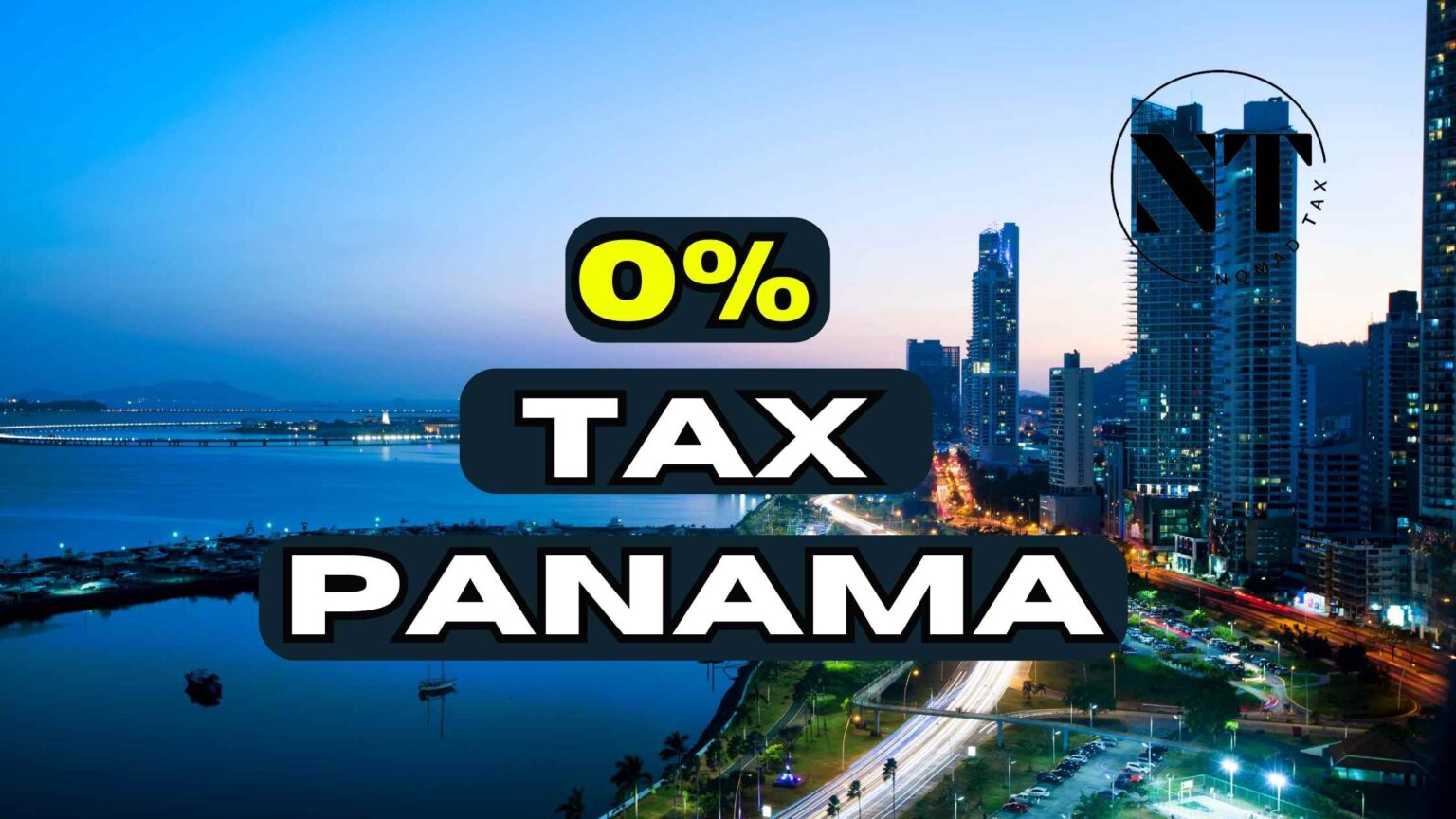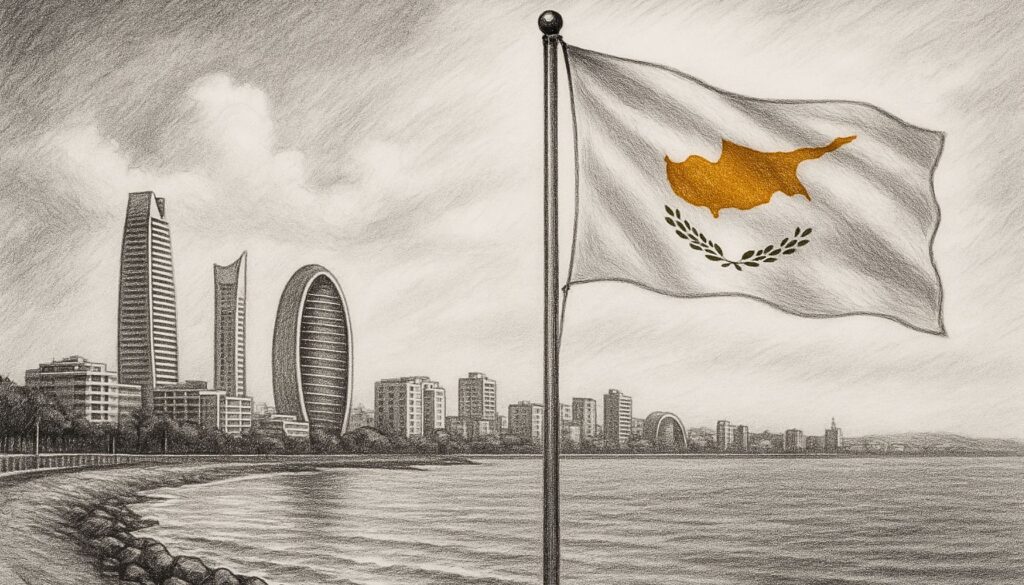A few years ago, the world was surprised to discover a massive collection of leaked documents that unveiled the best-kept secrets of some of the richest and most powerful individuals on the planet. These documents, affectionately known as the “Panama Papers,” highlighted Panama’s astonishing ability to attract investors and companies from around the globe.
So, if you’ve ever wondered how some of the most elusive magnates, footballers, or artists managed to protect their wealth so effectively, or if you’re simply looking for a way to grow your company while maintaining a smile on your face, you’re in the right place. Today, we are going to discuss how to obtain tax residency in Panama.

Indice del artículo
Key Features of Panama: Interesting Facts
Panama is a country located in the far southeast of Central America, bordered to the north by the Caribbean Sea, to the south by the Pacific Ocean, to the east by Colombia, and to the west by Costa Rica. The name “Panama” comes from an indigenous word meaning “abundance of fish and butterflies.”
Panama gained independence from Spain in 1821 and separated from Colombia in 1903.
The country is known as the “Bridge of the World, Heart of the Universe” due to its strategic position connecting South America with Central and North America.
Panama is famous for its canal, an engineering marvel that connects the Atlantic Ocean with the Pacific and is crucial for international maritime trade.
In terms of land area (75,417 km2), Panama is comparable to countries like Ireland or the Czech Republic.
The population of the country is approximately 4.3 million people. Most of the population lives in urban areas, especially in Panama City and its surroundings. The literacy rate is 95%. The median age of the population is around 29 years.
Over 880,000 people live in the capital, Panama City.
The population of the metropolitan area exceeds 1.5 million inhabitants. Around 10% of them are expatriates. People from many different countries, including the United States, Colombia, Spain, Venezuela, and China, live here.
The official languages of Panama are Spanish and, in some areas, indigenous languages like Ngäbe. Although English is widely used in business and tourism, assimilation for expatriates without basic knowledge of Spanish can be a challenge. Panamanians are known for their hospitality and are willing to help visitors practice their Spanish.
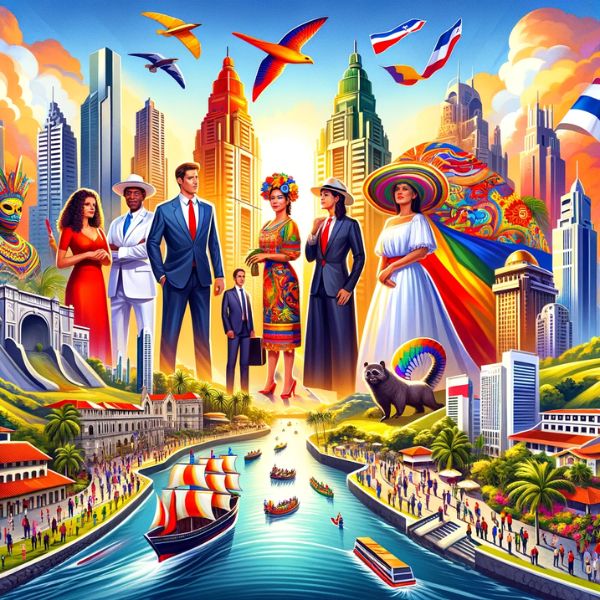
The following are the main economic indicators for Panama:
- The GDP per capita is approximately 15,679 US dollars.
- It shows an average growth of around 4-5% annually.
- The inflation rate is 0.7% annually.
- The unemployment rate is 7.1% of the population.
The national currency of the country is the Panamanian Balboa, which is pegged to the US dollar at a 1:1 ratio. The US dollar also freely circulates in the country and is commonly used in all transactions.
The most important sectors of the Panamanian economy, contributing a significant portion of the country’s budget income, are financial services, tourism, and, of course, the Panama Canal. The Colon Free Trade Zone also plays a crucial role in the economy as a major re-export and trade center.
Cost of Living in Panama: An Attractive Option for Expatriates
Panama has stood out as an attractive destination for expatriates and retirees, thanks to its relatively affordable cost of living compared to many other nations. It is possible to live comfortably in the suburbs of Panama City with a monthly income between 1,500 and 2,500 USD.
This income range is sufficient to cover housing, food, transportation, and entertainment expenses, comparable to the average income of a couple in large cities in Latin America. Expatriates with higher incomes, such as freelancers and retirees, can enjoy a more luxurious lifestyle.
The average monthly salary in Panama varies but is around 700 to 800 USD, according to local statistics. Although this is lower compared to expatriate incomes, it reflects the difference in the cost of living and local standards.
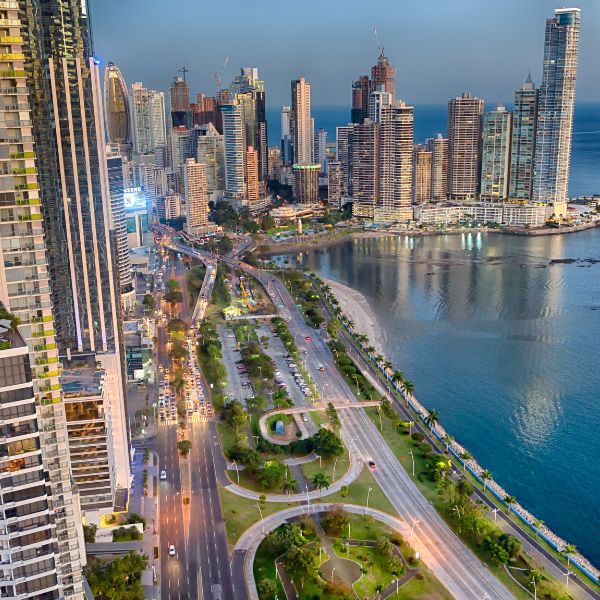
Regarding rent, a 50-square-meter apartment in central areas of Panama City can cost between 800 and 1,200 USD per month, while in less central areas, the cost may reduce to 500-700 USD. Buying property in Panama is also a popular option, with prices per square meter in metropolitan areas varying significantly based on location and amenities.
Panama offers an attractive environment for investment, especially in real estate and businesses related to tourism and services. Additionally, the quality of life, vibrant culture, and geographical diversity make Panama an ideal destination for many seeking a balance between cost and quality of life.
Is Panama considered a tax haven where you CANNOT establish your company or safeguard your money?
In a world where financial news is often overshadowed by stories of tax evasion and misconduct, Panama emerges as an inspiring narrative of commitment and transformation. Recently, during a plenary session in Paris, the International Financial Action Task Force (GAFI) has recognized Panama, along with other countries, for its significant efforts to improve its financial control systems.
Congratulations are due to Panama as, after a period of infamy, it has been removed from the GAFI gray list of money laundering countries.
Once viewed with skepticism, Panama has taken giant strides to polish its image on the international stage. The nation has implemented key reforms and committed to action plans to address previously identified shortcomings.
Meanwhile, other countries still struggle to find their way to compliance with international regulations. The GAFI “gray list,” which includes nations yet to address issues in their financial control systems, remains diverse and challenging. From Bulgaria to Croatia, extending to distant destinations like Uganda and the Philippines, the list reflects a global ongoing struggle against money laundering and terrorism financing.
In this context, Panama shines as an example of what can be achieved with a dedicated approach and effective collaboration.

The greatest benefit of tax residency in Panama: Low Taxes
It is crucial to understand that to benefit from a lower tax burden in Panama, you must first be considered a tax resident of the country. This involves meeting two essential criteria: residing for at least 183 days in a fiscal year in Panama and demonstrating that you have a permanent residence there.
Panama’s Territorial Tax System: Keys to a Lower Tax Burden
Regarding taxes, residents of Panama are subject to income tax. However, it is estimated that approximately 90% of residents do not pay direct taxes, as the first $11,000 of income is completely exempt.
Since most high-income individuals generate their money outside of Panama, the country does not collect a significant income tax. However, if you manage your business from Panama or work locally, you will need to pay income taxes.
Therefore, a 15% tax is applied to incomes ranging from $15,000 to $50,000, and a 25% tax is applied to amounts exceeding that limit. There is no tax on capital gains, inheritance, or assets. However, there is a small withholding tax of 5% on foreign income from Panamanian companies and 10% on dividends from domestic earnings. If interest and royalties are paid to a non-resident, the withholding rate increases to 12.5%.
How to pay very few taxes in Panama (or not pay them directly)
Although Panama is not a zero-tax jurisdiction, its territorial tax system allows for structuring finances in a way that incurs little or no tax in Panama if income comes from abroad.
Panamanian entities can benefit from a 0% rate if they operate outside the country and engage in international business. Those operating within the territory can enjoy a corporate tax rate as low as 7.5% if they qualify as micro or small businesses.
However, there is another aspect to consider. Even if you can follow certain basic protocols, set up your company correctly, and benefit from a 0% rate in Panama, it is also crucial to consider tax obligations in your home country.
If you come from a country that taxes based on residency, you may have to pay taxes in your home country on income generated by your company in Panama. Therefore, careful and strategic tax planning is essential to optimize your tax obligations, both in Panama and your country of residence.
How to obtain tax residency in Panama?
Panama offers a range of programs for you to enjoy tax residency. These programs are designed not only to boost investment and tourism but also to provide you with a path to a new life in this vibrant country. Here are the most prominent options:
- Qualified Investor Visa: This program, created to stimulate the Panamanian economy, allows foreigners to obtain permanent residence by investing in real estate (with a minimum value of $300,000 until October 2024, then $500,000), in the stock market, or through fixed-term deposits of $750,000 for five years. These investments must come from abroad and meet certain ownership and authentication conditions.
- Friends of Panama Visa: Updated in 2021, this visa is aimed at citizens of specific countries with friendly relations with Panama. It offers permanent residence through employment in a Panamanian company, real estate investment of at least $200,000, or fixed-term deposits of $200,000 for three years. This visa is initially granted for two years, after which permanent residence can be applied for. To obtain this visa, you could even self-employ in your own company.
- Retired Person: Ideal for foreign retirees or pensioners, this visa offers permanent residence in Panama with a guaranteed monthly income of at least $1,000, plus an additional $250 for each dependent. It includes benefits such as government payment exemptions, discounts on services, and the possibility to import personal items and vehicles.
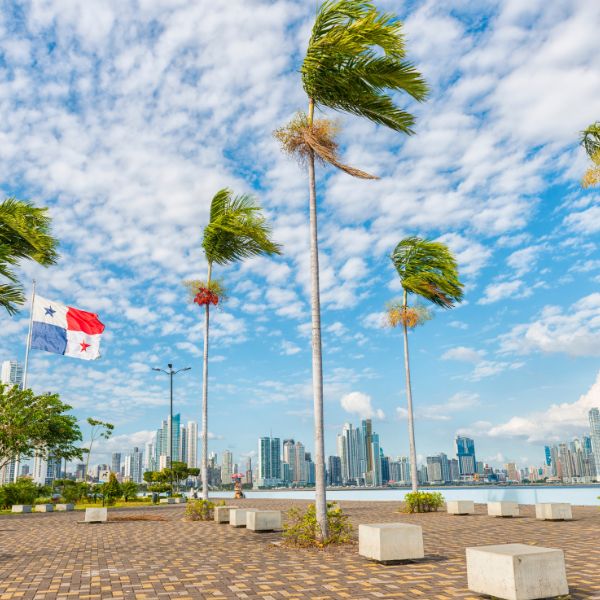
- Visa for Own Economic Solvency: For those with their own capital, this visa offers three alternatives: a fixed-term deposit of $300,000, real estate investment for the same amount, or a combination of both. After two years of provisional residence, permanent residence can be obtained.
- Panama-Italy Treaty: Exclusive to Italian citizens, this visa allows obtaining permanent residence by demonstrating economic or professional ties in Panama, such as establishing a company or investing in the country.
- Retired Rentier Visa: Ideal for those who can establish a fixed-term deposit in Panamanian banks. This visa not only offers financial returns but also a special Panamanian passport.
- Macro-Enterprise Investor Visa: Aimed at foreigners wishing to invest in macro-enterprises in Panama with a minimum share capital of $160,000. It requires the company to employ five Panamanians full-time and comply with social security obligations.
Each of these programs requires the assistance of a Panamanian lawyer and compliance with certain general requirements. Additionally, they offer the possibility of including your family in this exciting journey and, in some cases, the option to apply for Panamanian citizenship after a few years of residence. Contact Nomad Tax here for your consultation.
Keep in mind that even if you are allowed to obtain residency by spending only a few days in the country, to maintain tax residency in Panama, you cannot have tax residency anywhere else.
Conclusion: Panama, a Destination of Opportunities and Transformation for your tax residency
In summary, Panama has emerged as a fascinating destination not only for its natural beauty and strategic position but also for its attractive tax system and ability to attract global investments. From the “Panama Papers” to its recent removal from the FATF gray list, the country has demonstrated a serious commitment to improving its financial practices and transparency.
For expatriates, retirees, investors, and entrepreneurs, Panama offers a range of possibilities to grow, invest, and enjoy a quality life with significant tax benefits. With a variety of visa programs and a welcoming environment for international business, Panama positions itself as an ideal place for those seeking new opportunities in a dynamic and ever-evolving environment.
Frequently Asked Questions (FAQ)
¿Is Panama a tax haven where you cannot create a company or store money?
No, Panama is not a tax haven. Although it has faced challenges in the past, it has made significant efforts to improve its financial control systems and has been recognized by the FATF for these advancements.
What is the biggest benefit of being a tax resident in Panama?
The greatest benefit is Panama’s territorial tax system, which offers low income taxes, especially for income generated outside the country.
How can I obtain tax residency in Panama?
You can obtain tax residency through various visa programs, such as the Qualified Investor Visa, Friends of Panama Visa, Retired Person – Pensionado Visa, among others. Each program has specific requirements and offers different benefits.
Is Panama a good destination for retirees?
Yes, Panama is a very popular destination among retirees, especially due to its pleasant climate, low cost of living, and specific benefits offered to retirees, such as service discounts and tax exemptions.
Is it easy to do business in Panama for a foreigner?
Panama is known to be a business-friendly place, with a relatively easy environment for foreign entrepreneurs. However, like in any country, it’s important to understand local laws and seek appropriate advice, especially on legal and tax matters.
Is it possible to change from one type of visa to another once in Panama?
Yes, it is possible to change from one type of visa to another, as long as you meet the requirements of the new visa you wish to apply for. It’s important to consult with an immigration lawyer to understand the specific processes and requirements.
Can I include my family in my visa application?
Yes, most visa programs in Panama allow for the inclusion of dependents, such as spouses and children, in the visa application. Each program has its own rules about who qualifies as dependents.
What level of investment is required for the Qualified Investor Visa?
For the Qualified Investor Visa, a minimum investment is required, varying depending on the chosen option: $300,000 in real estate (until October 2024, then $500,000), or $750,000 in fixed-term deposits or investments in the stock market.
Do Panama visas allow multiple entries and exits from the country?
Yes, most Panamanian visas allow for multiple entries and exits from the country. However, it’s important to verify the specific conditions of your visa.
What happens if my visa application is rejected?
If your visa application is rejected, you should receive an explanation of the reasons for rejection. You can correct any issues and reapply, or in some cases, you may appeal the decision.
Do I need a lawyer to apply for a visa in Panama?
While not technically mandatory, it is strongly recommended to use the services of an immigration lawyer to navigate the visa application process in Panama, as it can be complex and requires detailed knowledge of local legislation.
Follow us for more on our Youtube channel.
